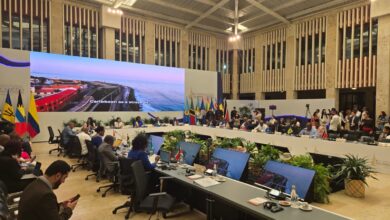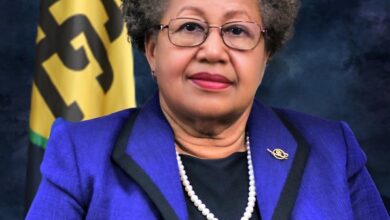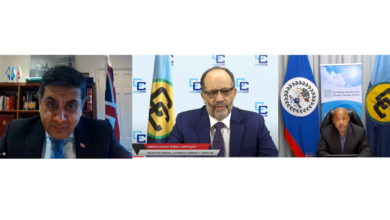CARICOM’s well prepared and experienced team of negotiators, and a focused, unified campaign, helped the Caribbean Community get its red line climate change issues all represented in the final Agreement at the just ended Climate Change conference, COP 21, in Paris, France. And, CARICOM Secretary-General, Ambassador Irwin LaRocque has hailed the strong regional collaboration, given the critical importance of climate change to the Region’s survival.
“We saw our community operating at its best on the international front in Paris,” Ambassador LaRocque stated emphatically as he reflected on the 30 November to 11 December conference that led to the approval of an historic Climate Change Agreement by 195 countries.

“The coordination was superb. I want to say hats off to our negotiators, led by Minister Jimmy Fletcher, Minister of the Environment and Sustainable Development in St. Lucia and of course the role played by all our Ministers and our Heads of Government. I was there feeling very proud. We were of a single mind. We were one body with several parts working together in unison to achieve a set of goals that we had set. We left Paris with … our objectives being addressed in the Agreement,” the Secretary-General added.
Minister Fletcher agreed that the coordinated approach strengthened the CARICOM campaign.
“One of the things that made a big difference this time around has been the CARICOM coordination and the presence of the CARICOM Secretary-General. The SG’s presence here, encouraging us, allowing us to caucus, keeping the CARICOM team tight, has made a difference in how focused we’ve been and in ensuring that it’s the CARICOM position, and not just Member States’, that came across,” the Minister said.
The view was also supported by Haiti’s lead Advisor and negotiator, Mr. Renald Luberice.
“I was very impressed to see the political involvement of CARICOM in support of CARICOM country delegations. This is the first time I’m seeing CARICOM being involved in this manner and it sent a very good signal,” Mr. Luberice said on the sidelines of the Conference.
CARICOM Heads of Government had set up a Task Force just over two years ago, under Minister Fletcher’s Chairmanship and including representatives from Member States, to handle a series of important international engagements, including COP21. This Task Force of expert negotiators has since been constantly engaged in intensive negotiating sessions, including five meetings this year in France.
As many as seven CARICOM Heads of Government, including the Chairman, Prime Minister Freundel Stuart of Barbados and the Lead Head of Government on Sustainable Development, Prime Minister Dr. Kenny Anthony of Saint. Lucia, made their presence felt at the start of the conference, setting the political objectives and giving directions to the Ministers and technical negotiators. They helped to mobilise third-party support for CARICOM positions through direct engagements, including a series of high level bilateral meetings. Prime Ministers Stuart and Anthony led the Region’s engagements with the United States President and the UN Secretary-General.
The CARICOM campaign, with its popular mantra “1.5 to Stay Alive” successfully promoted the ‘temperature rise’ and a short-list of other critical issues to the Region. The long-term temperature goal was pushed as an existential issue for the Region, and CARICOM negotiators were able to influence a number of countries in hard negotiations, to have language included in the final text which takes account of the 1.5 degree option.
“Going into Paris we had an uphill battle against those whose ambition rested on 2 degrees and for us that was just not acceptable, that was a red line for us. We were seeking 1.5 degrees or below. We came out of there with language which has set the long term goal of 1.5 with periods of taking stock every five years of where we are, in terms of countries contribution to mitigation, and to use every stock-take period to ensure we ratchet up the ambition to the point where we reach 1.5,” the Secretary-General noted.
“For quite some time we’ve been talking about the impact of climate change on our Community; that it’s an existential issue for us; that it’s not something that is coming, it is something that we are experiencing now. We’ve had some really odd and extreme weather events in several of our Member States – Dominica, St. Vincent and the Grenadines, St. Lucia, The Bahamas. So we have begun to feel the impact of climate change. We have also seen coral bleaching which is a significant issue for us as it has an impact on the marine food chain and will eventually have an impact on our fisheries sector. So for us this Agreement is significant,” he added.
The CARICOM negotiators also addressed the special circumstances for the financing of the implementation activities in Small Island and low-lying Developing States, SIDS, and the text includes a baseline contribution of 100 Billion USD annually. The negotiators regarded the discussions on Loss and Damage arising from slow onset climate impacts as being among the most difficult in the negotiations. In the end, the Region was able to get what it wanted – separate treatment of Loss and Damage (apart from Adaptation) in the Agreement and the permanent housing of the international mechanism to address Loss and Damage. The Region’s position on REDD Plus (forest conservation) is also reflected in the language of the text. This is of particular significance to Guyana and Suriname, as well as other Member States with forested areas.
The Caribbean Community now faces the challenge to use the Agreement as the basis for future climate action.
“There is lots to be done,” Ambassador LaRocque has noted.
“We need to ratchet up our capacity both at the regional level and the national level. We are saying there are resources that can be available to us and we need to be able to access those resources,” he added.
The Secretary-General said the Region will have to take steps towards both adaptation and mitigation.
“A critical part of mitigation for us is renewable energy, and there is a lot of investment required in this area. We recently put in place a renewable energy centre that should be operational in the new year and will also be a hands-on technical facility for Member States to allow them to realise the tremendous potential we have in geo thermal, hydro and other areas.”
“On the adaptation side, a lot needs to be done to adapt our entire countries to the effect of climate change. We must also be able to have the capacity to prepare for those, whether it’s the case of preparing projects or engineering. It’s a whole slew or areas. The Caribbean Community Climate Change Centre (CCCCC), set up since 2005 to coordinate the Region’s response to Climate Change, will have a critical role in coordinating that effort among our Member States.”
Editors:
See photo album of CARICOM negotiators at COP 21:
See video copy of COP 21 interview with CARICOM Secretary-General




![Photo of MINISTERIAL STATEMENT FROM THE 112TH SPECIAL MEETING OF THE COUNCIL FOR TRADE AND ECONOMIC DEVELOPMENT (COTED) [ENVIRONMENT AND SUSTAINABLE DEVELOPMENT]](https://caricom.org/wp-content/uploads/caricom_standard-2-390x220.jpg)

